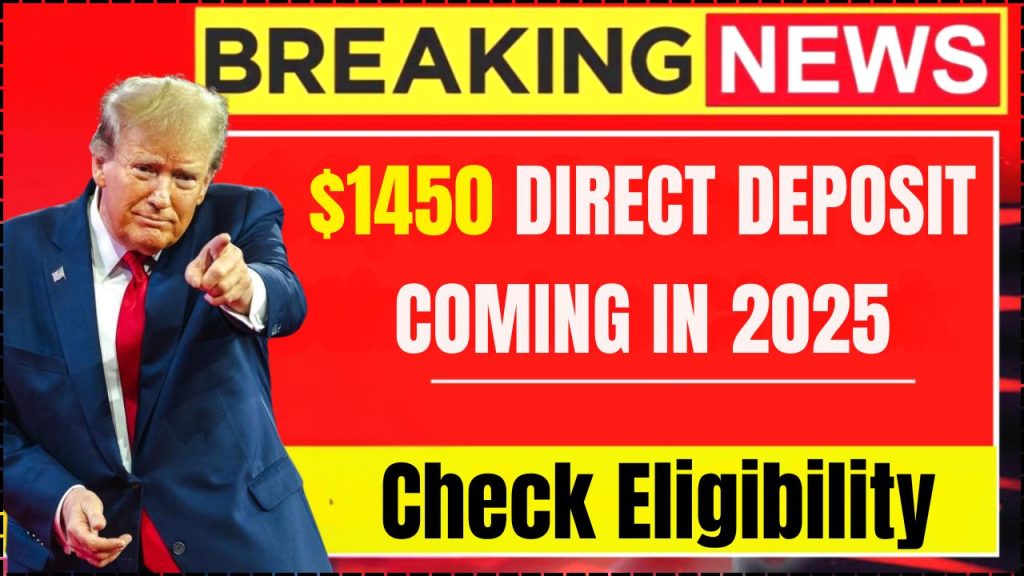
Are you wondering about that $1450 direct deposit you’ve heard might be coming your way in 2025? Many Americans are searching for answers about this potential financial boost during challenging economic times. This guide clarifies what’s happening with these payments, who qualifies, and how to check your eligibility before important deadlines arrive.
The Truth About the $1450 Payment: Recovery Rebate Credits Explained
The payment being discussed isn’t a new stimulus program but rather the distribution of unclaimed 2021 COVID-19 economic impact payments. According to official information from the IRS, approximately 1 million taxpayers who didn’t claim their 2021 Recovery Rebate Credit are receiving payments automatically. These payments, worth up to $1,400 per eligible person, were scheduled to be distributed in December 2024 and arrive by late January 2025.
Critical April 2025 Deadline: Last Chance for Claims
If you never filed a 2021 tax return but might qualify for this payment, time is running out. As tax expert Robert Nassau from Syracuse University warns, “You’re running out of time.” The final deadline to file and claim this credit is April 15, 2025. After this date, any unclaimed funds will be permanently forfeited, making immediate action essential for potential recipients.
SSI Benefits vs. Stimulus: Understanding the Difference
Some confusion may stem from increases in regular benefit programs happening simultaneously. The Social Security Administration has implemented a 2.5% Cost-of-Living Adjustment (COLA) for 2025, which means some Supplemental Security Income (SSI) recipients may receive payments approaching $1,450. However, this represents an adjustment to existing benefits rather than a new stimulus payment.
How to Verify Your Eligibility and Payment Status?
If you think you might be eligible for the Recovery Rebate Credit from 2021, follow these verification steps:
- Create an online account with the IRS to check your payment status
- Review your tax records under the “records and status” section
- If you haven’t filed a 2021 return, do so before the April 15, 2025, deadline
- Be vigilant about scams requesting personal information via email or phone
Protection Strategies Against Financial Misinformation
During economic uncertainty, misinformation about government benefits often circulates widely. Always verify information through official government websites like IRS.gov or SSA.gov before taking action. Be particularly wary of websites or social media posts claiming to have insider information about upcoming payments without official government sources to back their claims.
Alternative Financial Assistance Programs Available Now
While the widely discussed $1450 direct deposit may not be available to everyone, many Americans qualify for existing assistance programs that could provide comparable or greater financial support:
- Supplemental Security Income (SSI) for low-income elderly or disabled individuals
- Supplemental Nutrition Assistance Program (SNAP) for food assistance
- Temporary Assistance for Needy Families (TANF) for families facing hardship
- Various state and local relief programs designed for specific needs
Looking Ahead: Separating Fact from Fiction About the $1450 Direct Deposit
As financial challenges continue for many Americans in 2025, accurate information remains crucial for effective planning. The “$1450 Direct Deposit” referenced in various online sources isn’t a confirmed nationwide stimulus program but rather a combination of unclaimed COVID-era benefits and regular adjustments to existing programs.
Focus your energy on determining your eligibility for the Recovery Rebate Credit before the April deadline and exploring alternative assistance programs you may qualify for. By relying on official sources and taking prompt action, you can maximize your financial resources during these challenging economic times.
Disclaimer: This article contains information gathered from publicly available sources as of May 2025. Government programs and benefits can change. Always verify eligibility requirements and application procedures through official government websites or representatives before making financial decisions.

Katherine Johnson is a passionate writer with a keen interest in storytelling, content creation, and creative expression. She enjoys exploring diverse topics and crafting engaging narratives that captivate readers.



